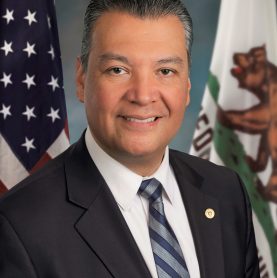Connecting families with affordable child care and preparing child care providers to offer a high level of care are critical functions of Child Care Resource Center (CCRC), but to be most effective, this work requires support from lawmakers willing to fight for access and funding.
We are thankful for legislative partners like newly-appointed U.S. Sen. Alex Padilla (CA-D), who has long advocated for children, families, and child care providers.
The senator grew up in the San Fernando Valley, where CCRC’s headquarters is located. The Pacoima-native experienced first-hand the hardships that come with growing up in a low-income community.
“Our neighborhood had more than its share of challenges—from poverty to crime to unhealthy air—but my mom felt blessed that we had the sanctuary of a backyard. And we had a strong sense of community,” Padilla says.
Padilla, who made history this year as California’s first Latino senator, is the son of Mexican immigrants.
“(My parents) arrived from different regions of Mexico with little formal education, but a tremendous work ethic and big dreams,” Padilla says. “Together, they raised my sister, my brother, and me in a modest three-bedroom house in Pacoima. It was there that my parents taught us about the values of service to others and of getting a good education.”
He recalls his father working long hours as a short order cook in local restaurants and his mother cleaning houses to support the family. Even so, he says, finding affordable child care was difficult for his parents.
“I can still remember being dropped off at the community pool with my siblings on summer days so we’d have somewhere to stay while our parents were at work,” Padilla says. “Our local public library was another one of my safe havens. I would spend hours after school at the Pacoima library reading books and exploring new topics.”
Though he admits he was more interested in baseball than politics at the time, a young Padilla developed an appreciation for learning and went on to attend college at the Massachusetts Institute of Technology. When he returned home with his newly-minted degree in mechanical engineering, Padilla found his community in trouble.
“We began to see the rise of anti-immigrant rhetoric reach a fever pitch with the Prop 187 campaign,” Padilla says of the so-called Save Our State initiative that aimed to prohibit undocumented immigrants from using community services. “I saw people like my parents—hardworking people in search of a better life—being attacked and knew my community needed a bigger seat at the table. It drew me into politics, and I quickly began working on campaigns before I ran for LA City Council.”
Throughout his policymaking career, both at the local and now federal level, Padilla has fought for the rights of undocumented immigrants and families. In addition to voting for the American Rescue Plan, which includes a major expansion to the Child Tax Credit and CalFresh food assistance program, Padilla is co-sponsoring the Child and Dependent Care Tax Credit Act. This federal legislation would provide relief to working families who need child care, which would further expand the full child and dependent care tax credit to more families and increase the maximum credit from $1,050 to $4,000 per child under the age of 13.
“We are the wealthiest nation in the world. Parents should not be left to make the impossible choice of paying for food or paying their utility bills so their kids can log into online class,” Padilla says. “That’s why the legislation we pass has to focus on helping working families.”
Padilla says his vote on measures aimed at helping working families are steps toward his bigger goal of closing the gap between America’s poorest and wealthiest residents.
“We see two Californias where Latino, Black, and Asian households are three times as likely to be behind on rent,” Padilla says. “We see two Californias where the stock market reaches new highs for some, while in the San Fernando Valley, too many families depend on city or church food distribution sites to feed their children. One of my priorities as a U.S. Senator is to close the gap between the two Californias and that starts with building back more equitably as we recover from the COVID-19 Pandemic.”


